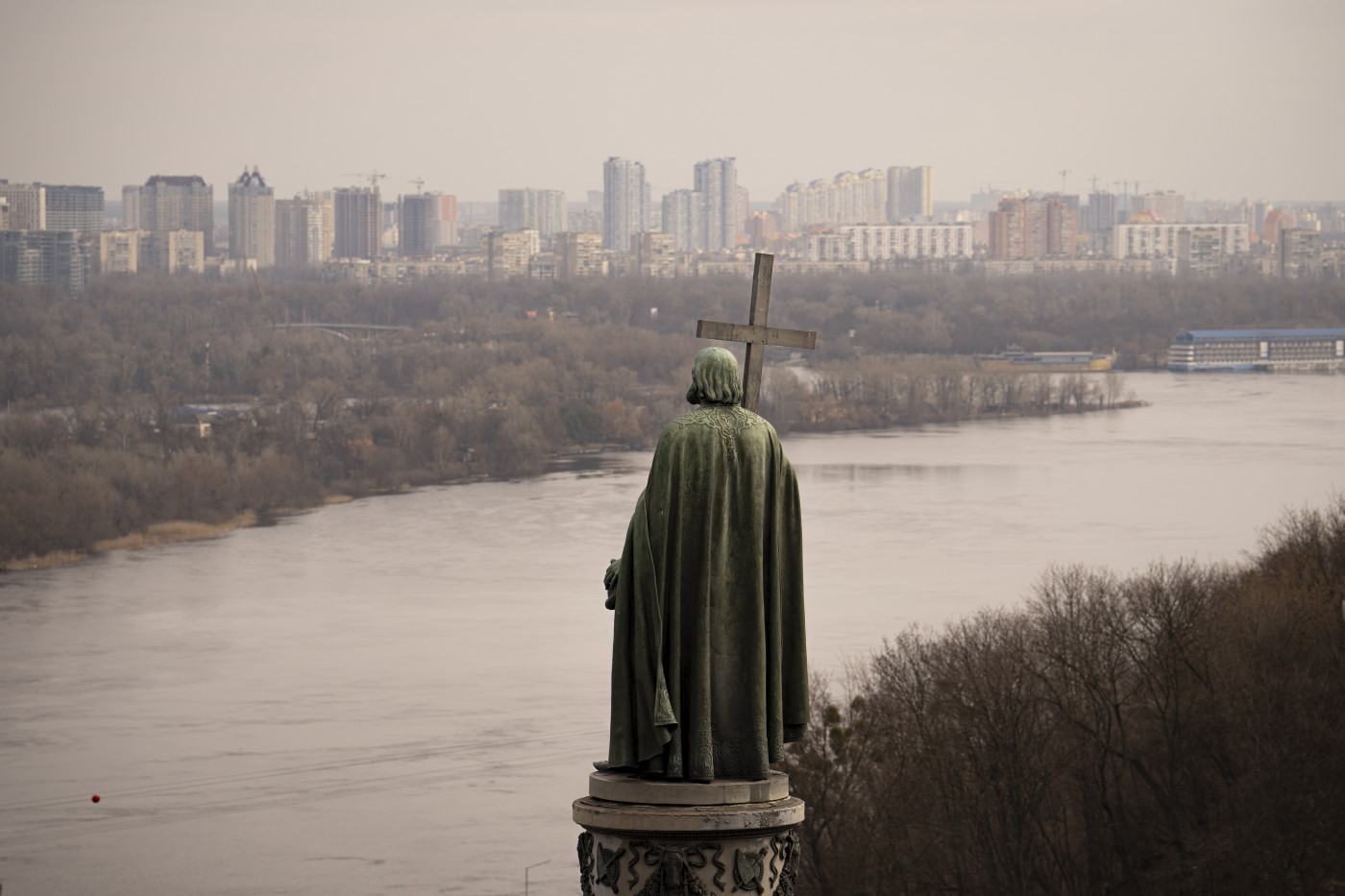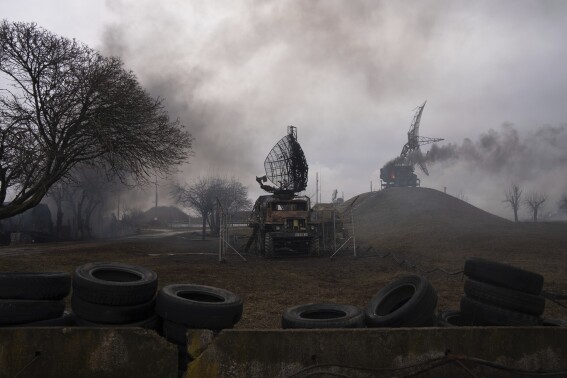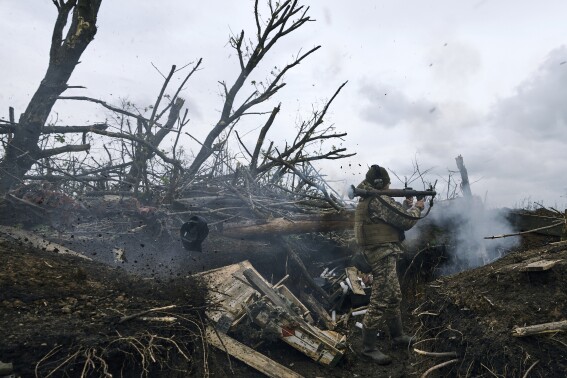Putin's Trump Gamble
Russia and the U.S. hold elections this year and, even if the result in the former is a foregone conclusion, whether Vladimir Putin will again have Donald Trump as his American counterpart afterNovember's vote is far less certain.
Saturday marks two years since Putin launched his full-scale invasion of Ukraine which sparked U.S.-led sanctions on Moscow. Kremlin propagandists have touted their preference for Trump to return to the White House, seeing the Republican primary frontrunner as better serving their interests.
But the messaging from the Kremlin got more mixed when Putin told Russian state media this month he would in fact would prefer Joe Biden to retain the U.S. presidency because he was "predictable."
The interview preceded the death of Alexei Navalny, the most prominent Russian opposition figure in recent years, whose demise Biden has pinned on the Russian leader.
Even before the war Putin started, Biden had called Putin a "killer" so could the Russian leader be serious when he says he prefers the "more experienced" Biden?
"I don't believe for a second Putin really would genuinely prefer Biden over Trump," Brian Taylor, author of The Code of Putinism, told Newsweek. "Trump's and Biden's views on support for Ukraine and the war against Russia are so radically different that Putin would see it in his interest for Trump to return."
"Putin hopes this will happen and I think he believes that if Russia can sustain itself over the next year, and then Trump returns, that he will basically have a free hand in Ukraine," said Taylor, politics professor at Syracuse University, New York.
"That's not necessarily the case in reality, but I think that's how he'll perceive things."
When president, Trump's reported links with Putin were subject to scrutiny and the current GOP primary frontrunner avoided agreeing with U.S. intelligence that the Russian leader had interfered on his behalf during the 2016 presidential election.
Trump has also praised Putin as "smart" and boasted about his good relations with the Russian leader, even claiming without providing details that he could end the war in Ukraine started by Putin within "24 hours."
Challenging NATO
Putin was also likely to be listening when during his presidency, Trump took pot shots at NATO, a theme he revisited on February 10, when he told a rally in South Carolina that Russia could "do whatever the hell they want" to members that did not meet a two percent minimum defense spending commitment.
The positions of Biden and Trump on European security, the transatlantic relationship and the war in Ukraine "are completely different," said Taylor. "One is very, very favorable to Vladimir Putin and the other is not."
"It's in Russia's interest for there to be chaos in the transatlantic relationship and uncertainty about whether the alliance can hang together," Taylor said, "that's what a figure like Trump would bring."
But even if Trump were unable to change the U.S. role in NATO or fails in his White House bid, Putin can still point to questions over the alliance's future as being part of the conversation, said Ken Osgood, history professor at Colorado School of Mines.
For Putin, this is already "the single biggest victory attributable to any Russian leader since 1949," Osgood told Newsweek. "Cracking NATO solidarity has been a goal of every Russian leader since Joseph Stalin."
Kremlin propagandists may have welcomed Trump's victory in 2016 but during his term, he retained many of the policies and sanctions on Moscow started by the Obama administration, suggesting he was not the friend to Russia they had hoped for.
"They (Russia) would welcome Trump of course but they don't have a very successful experience with him," said Oleg Ignatov, senior Russia analyst at Brussels-based NGO, the International Crisis Group. "For them, he was too unpredictable," he told Newsweek. "He promised to restore the relationship with Russia but he failed.
"He's not their dream candidate but in the current environment, for them it would be better to have somebody else in the White House, except Biden," said Ignatov.
Much has changed since Trump's victory which took place two years after Putin seized Crimea in 2014, an illegal annexation that was the forerunner to the full-scale invasion that started two years ago. "In 2016 they wanted more to undermine (Hillary) Clinton than support Trump—there was a bit of revenge and there were no geopolitical stakes in those elections," said Ignatov. "Now the stakes and the situation are totally different."
Russian Election and U.S. Aid
Russians go to the polls starting March 15 in what is expected to be a tightly controlled Potemkin plebiscite likely to hand Putin another six years in the Kremlin.
On the campaign trail, Putin can sell his forces' capture of Avdiivka, in Ukraine's Donetsk oblast, as a military success. Analysts and allies of Kyiv say it highlights the need for further military assistance as a $60 billion package remains deadlocked in U.S. Congress. But Trump's campaign rhetoric to end further U.S. aid is one embraced by some Republicans, which Putin is keenly aware of.
"President Biden for the past two years has been willing to provide Ukraine with assistance, albeit too slowly. President Trump has spent the past two years saying that he could end this war in 24 hours. So of course, Putin is going to prefer the candidate he thinks he can make a better deal with," said Luke Coffey, a Hudson Institute senior fellow.
"Trump would not be willing to provide continued support to Ukraine. Doing so is very unpopular with his base and he likes to see himself as this great dealmaker that's going to solve the biggest conflict since the Second World War," Coffey told Newsweek.
"I can see a situation where if President Trump wins a second term, President Putin will try to go big in Ukraine more than he is now, and then unilaterally pulling back a little bit as a sign of goodwill that President Trump would latch on to, as an opportunity to make a deal between Russia and Ukraine."
Trump will not be thinking of the long-term future of Ukraine or the prospect that a frozen conflict would see Russia try to take the whole of the country in years to come, said Coffey. "As long as he has brokered a deal between Ukraine and Russia and fighting doesn't break out during the rest of his term, he won't care."
However, Putin's boasts about closer ties with China and his vision of a pivot away from the West towards the so-called Global South shows he is not just fixated on the White House.
"We should not overestimate the effects of what happens in foreign countries on Putin's thinking," Konstantin Sonin, a Russian-born economist and Kremlin critic who was charged in absentia in Moscow for spreading "fake news" about the Russian army, told Newsweek. He noted that before his full-scale invasion, "Putin basically stopped listening to everyone, even if what they were saying was extremely plausible."
"I do not think Putin's thinking is affected by what is going on in the United States," he said. Putin wants Trump to be elected and for European governments to be constantly harassed by right-wing politicians, "because this decreases the flow of munitions to Ukraine, so he works on this—but he's not dependent on this," said Sonin, professor at the University of Chicago Harris School of Public Policy.
Sonin also believes that even if he were to take office, Trump's boundary-pushing rhetoric challenging NATO did not mean he would stop an alliance response under Article 5 in which an attack on one country is considered an attack on all.
"Whatever Trump says now, what he would be saying after, say, five American marines are dead because of a Russian missile in Poland, will be totally different."
Disclaimer: The copyright of this article belongs to the original author. Reposting this article is solely for the purpose of information dissemination and does not constitute any investment advice. If there is any infringement, please contact us immediately. We will make corrections or deletions as necessary. Thank you.




